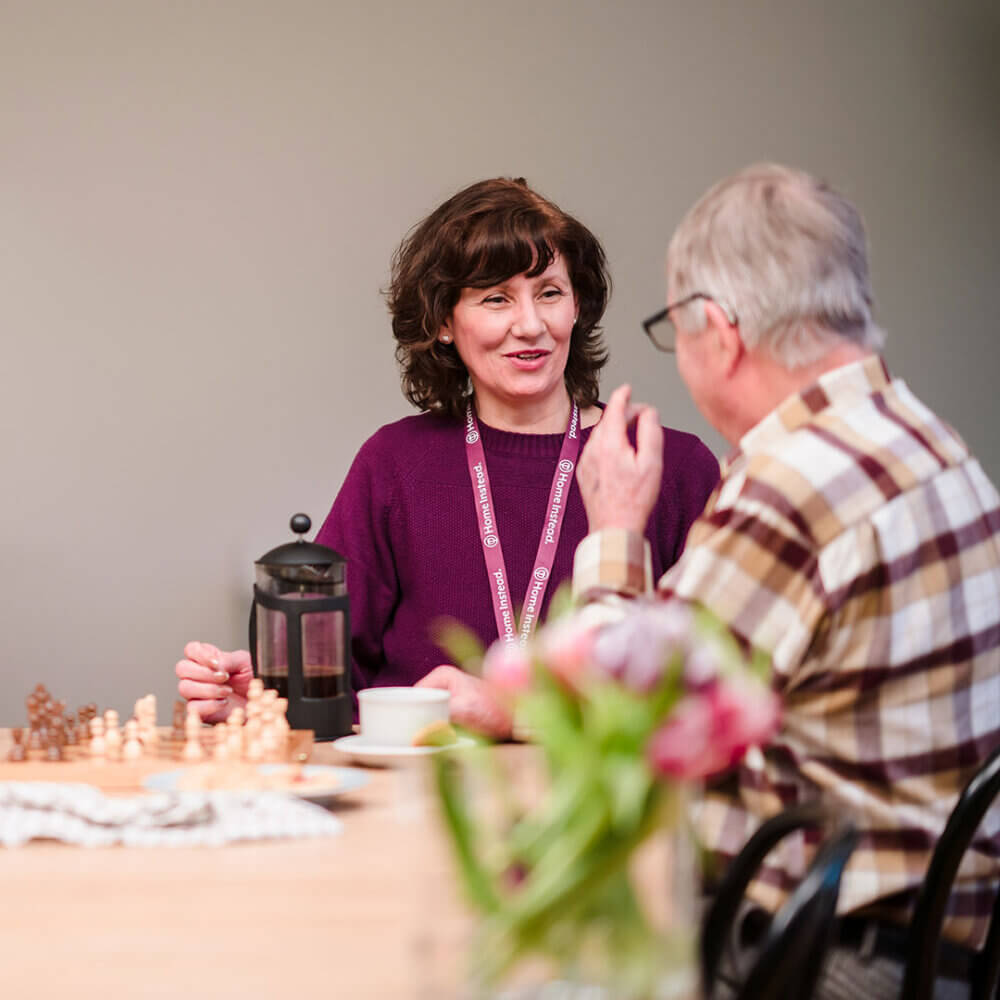Alzheimer's Care at Home: A Compassionate Approach
Caring for someone with Alzheimer’s at home may seem daunting for loved ones, but it doesn’t have to be faced alone.

Home Instead provides specialised in-home services that are tailored to the specific needs of each person living with this condition or other dementias.
This blog post looks at how home care offers real benefits to both the individual with dementia and their families by exploring ways of structuring effective plans for practical assistance within a familiar setting.
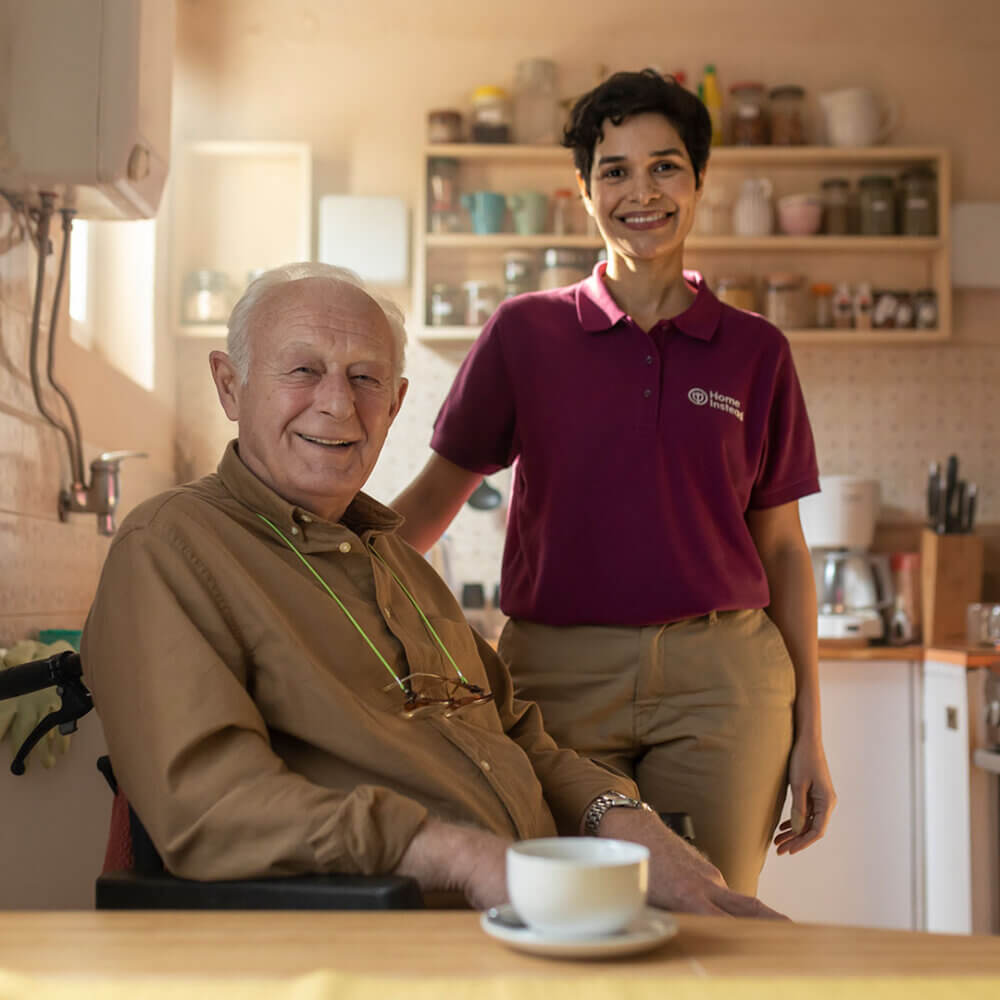
Key Takeaways
- Understanding Alzheimer’s Disease and its impact involves recognising how the person is impacted by their dementia, and taking action to create a care plan to manage those impacts.
- Dementia care at home should take a highly personalised approach enabling the person affected to maintain routines, daily living activities and hobbies in a familiar environment.
- Help in deciding between care at home or residential care – taking into account the preferences, wishes and needs of the individual whilst meeting their needs and keeping them safe.
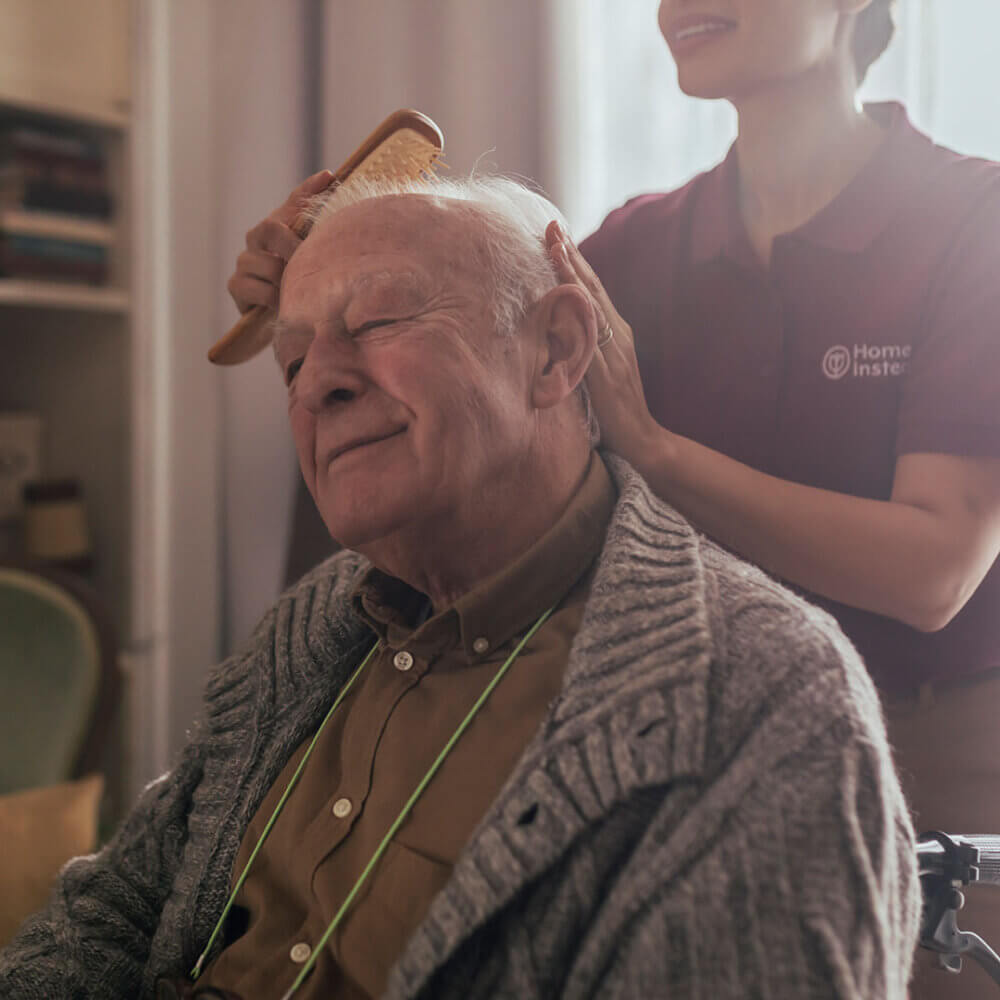
Understanding Alzheimer's Disease and Its Impact
Family members of a person living with dementia may be familiar with the symptoms and how they are impacting the person day to day but unsure how to effectively support their care needs.
It’s never too early for families to call Home Instead to discuss how we may be able to support a loved one’s care whilst maintaining their independence and quality of life.
Although many families choose residential facilities as their loved one’s dementia progresses, many still want their loved one to remain at home where their surroundings are familiar to them and mean the most to them.
Our Care Professionals can assist with a huge range of care and support giving families and loved ones the help they may need. This includes both practical help with daily living activities, emotional support and assistance to help keep a person safe at home.
Early signs and symptoms
The first noticeable sign of Alzheimer’s disease is often memory related difficulties In particular, there may be difficulties recalling recent events and learning new information. Memory problems can make a person with Alzheimer’s more likely to:
- forget about recent conversations or events
- get lost in a familiar place or on a familiar journey
- forget appointments or significant dates
- become increasingly disorganised
Other early stage symptoms may include:
Thinking and reasoning difficulties; a person with Alzheimer’s disease may also develop problems with their thinking and reasoning abilities at first. These may include:
- difficulty concentrating, such as regularly being unable to follow a conversation, and needing silence and complete focus to understand what someone is saying
- difficulty planning or organising – for example, struggling to do the steps of an everyday task in the right order (such as cooking a meal)
- getting confused about what time of day it is, or where they are.
The person may also think they are living at a different time in their lives. For example, thinking they went on holiday somewhere recently when they actually went there several years ago.
Language problems;language andcommunicationdifficulties are common in the early stages of Alzheimer’s disease. They tend to involve difficulties finding the right words and not being able to concentrate on what’s being said. As a result, a person with Alzheimer’s may:
- use more general words like ‘thing’ or ‘stuff’, or say ‘her’ or ‘him’ when they would previously have known a person’s name
- pause while they try to think of the word they want to use, particularly when it’s a word they wouldn’t use very often.
It can feel like the word is on the ‘tip of their tongue’ but then it doesn’t come to them. This can also happen with names of people or places.
Changes in mood;A person in the earlier stages of Alzheimer’s disease may become anxious, more easily annoyed, sad or frightened. Many people lose interest in talking to others, or in the activities and hobbies they used to enjoy.
They may become more withdrawn over time. It’s often hard to say if these changes in mood are caused by the disease itself or the frustrations of struggling with everyday tasks because of their symptoms.
The emotions caused by living with dementia can be challenging for both the person with dementia and those close to them. Anyone finding things difficult should ask for support from a GP or other professional.
Providing well defined support can mitigate the impact of these various early stage issues and help people navigate daily life.
Early recognition of these symptoms is essential. This may facilitate an early intervention and providing early stage support makes it less problematic to enhance care as symptoms progress.
Progression of Alzheimer’s
The symptoms of Alzheimer’s disease will get worse over time. This usually happens over several years.
As Alzheimer’s progresses, problems with memory loss, language, reasoning and perception get worse. This means that a person will need increasing support with everyday living.
As the disease progresses, the person may also start to behave in ways that seem unusual or out of character. For example, they may:
- become agitated or restless
- pace around
- call out or
- repeat the same question over and over again
- react aggressively
- experience delusions, or less often hallucinations
In the later stages of Alzheimer’s, the person may:
- have increasing problems with daily living, such as eating and drinking which may lead to weight loss
- have problems with continence
- become severely agitated or confused towards the late afternoon or early evening, sometimes known as sundowning
- experience changes in sleep patterns, such as sleeping more and more during the day.
Like most types of dementia, Alzheimer’s disease is a life-shortening condition. This means people with Alzheimer’s tend to live for a shorter time than people without it.
Planning for end of life is important for anyone with a life-shortening condition. It can be upsetting to think about, but planning ahead can help to meet the person’s needs at the end of their life.
To ensure that care and support is appropriate as symptoms progress regular care and support reviews will identify where adjustments need to be made to adapt that progression.

The Advantages of Care at Home for People with Alzheimer's
At Home Instead, we are dedicated to providing care at home for people living with Alzheimer’s that provides them with a sense of security, and stability through support from a team familiar with their situation..
We will ensure that they receive a personalised service tailored to their specific needs and helping promote their independence while supporting overall wellbeing.
This approach to care at home can be incredibly beneficial not only for those living with dementia but also as support to family members giving everyone involved greater peace of mind knowing their loved one will be cared for properly.
Familiar environment
Providing support to those living with Alzheimer’s is vital for their well-being.
Here are the 3 main ways this can be achieved:
- Maintaining familiar routines
- Safeguarding existing relationships
- Developing relationship led support by a regular team who will develop an intimate understanding of how to effectively deliver the care and support the person needs.
These strategies help reduce anxiety and promote independence and assist them in maintaining a sense of self.
Ultimately, it allows people to stay connected to their familiar surroundings on an emotional level despite any other changes that may occur as symptoms progress.
Personalised care
Care at home strives to provide a personalised approach for individuals with Alzheimer’s that recognises their individual histories, personalities and interests.
The service seeks not only to safeguard the physical health and emotional wellbeing of those living with dementia but also to promote and maintain independence.
Effective care at home means families may not have to consider moving their loved ones to a residential care setting whilst achieving the same outcomes. It is about more than just addressing day to day living activities; It provides emotional well-being too!

Comprehensive In-Home Services Provided by Home Instead UK
Home Instead offers a range of in-home services designed to give personalised care and support to People with Alzheimer’s..
Personal care
Home Instead Care Professionals provide personal care assistance to People with Alzheimer’s in the comfort of their own homes.
This includes helping with daily living needs such as bathing, dressing and medication management while also ensuring that they keep up a high standard of personal hygiene and preserve their dignity.
Our trained professionals can offer support for more specialised requirements like catheter care or PEG feeding if needed. With this personalised service, Home Instead enables individuals living with dementia to maintain autonomy even when dealing with a daily routine that it may be challenging for them to manage alone.
Companionship
Home Instead provides companionship services to aid those living with Alzheimer’s, enhancing their well-being and reducing feelings of loneliness.
Care Professionals can engage in recreational activities, helping stimulate cognitive functions while creating a sense of routine and familiarity in their lives.
Through offering emotional support as well as social interaction, these visits provide vital comfort during difficult times for people living with Alzheimer’s or other dementias.
Home Help Assistance
Home Instead provides Home Help to ensure that individuals with Alzheimer’s can focus on their well-being instead of day-to-day tasks and enabling their families to spend more time engaged in maintaining their relationship and enjoying activities with their loved ones.
The service includes light housekeeping, meal preparation and transportation services. Care Professionals assist by doing laundry, changing beds as well as providing nutritious meals and help keeping people well hydrated.
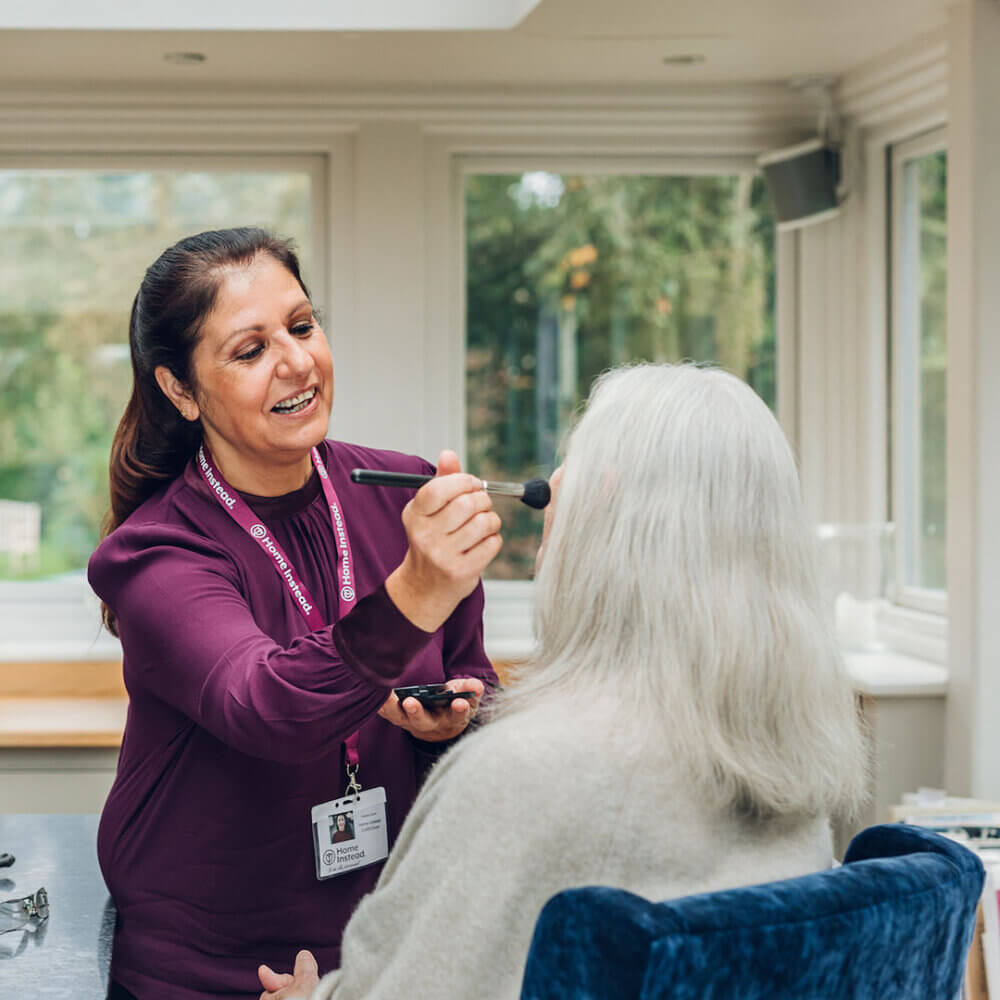
Planning and Executing Effective Alzheimer's Care at Home
Providing effective Alzheimer’s care at home requires careful planning and the execution of a well defined, personalised care plan by well trained Care Professionals that ensures safety of the person affected and should establish routines with the activities of daily living and promote cognitive stimulation and social engagement.
This approach facilitates the independence of the person living with Alzheimer’s and promotes positive well-being which usually includes activities that appeal to them such as puzzles or art projects, socialising with friends/family, and participating in physical activity, all of which are tailored specifically for their needs.
Creating a safe environment
We can promote the well-being and physical safety of a loved one living with Alzheimer’s by identifying through our risk assessments any modifications that may be necessary to ensure a safe living environment. This may include recommendations for assistive technology including personal alarms, monitors or memory prompts/reminders.
Establishing routines and activities
Our Care Professionals can deliver structured support tailored to a person’s known routines, needs and preferences that promotes independence and well-being. These routines may incorporate enjoyable activities, offering the individual an opportunity for purposeful accomplishment while providing them with emotional connections that contribute positively to their overall well-being. By carefully considering what brings pleasure and enjoyment our Care Professionals can create routines which enhance the quality of life for those impacted by their situation.
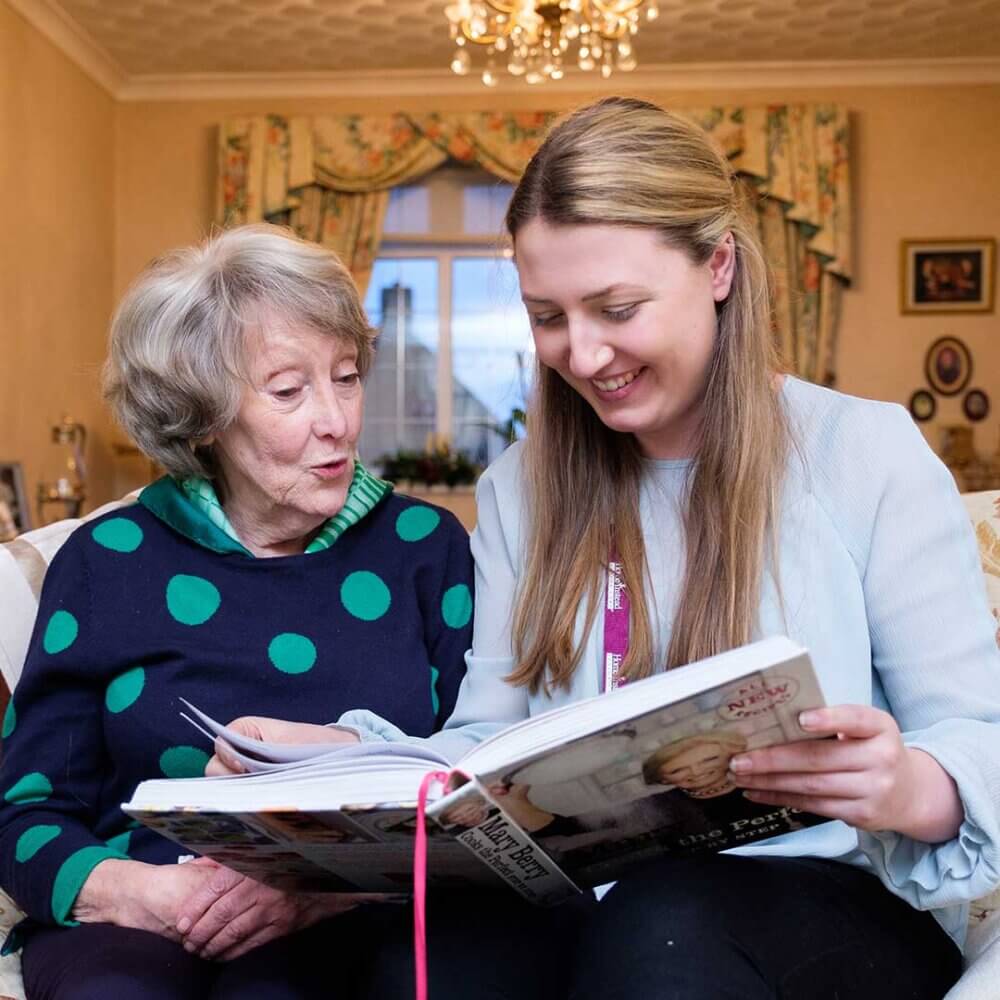
In-Home Elderly Care as an Alternative to Residential Care
Many families will go through the process of considering the best option for elderly care; in-home or care home.
- Home Instead’s care at home is a proven, reliable alternative to residential care.
- With your loved one receiving care in their familiar surroundings whilst still engaging in their daily routines, living with beloved pets or engaging in hobbies they enjoy, will significantly improve their quality of life.
- Taking the financial implications into consideration as well as what level of support is needed combined with the individual’s known preferences will enable families to make a knowledgeable decision about which type of care works most effectively for them.
Benefits of in-home elderly care
Families who choose home care for their loved one with Alzheimer’s can have specialised support that enhances their loved one’s quality of life while also maintaining family bonds.
In-home elderly care has several advantages, such as the personalised attention and the ability for individuals to stay in a familiar environment where they can continue everyday routines and hobbies. But these benefits not only apply to the person but also bring peace of mind to families and other loved ones in knowing that the person is still in the place that is most familiar to them; home.
Making the decision
When it comes to choosing between in-home and residential care for individuals with Alzheimer’s, several factors need to be taken into account:
- The type of care needed
- Financial implications
- The known preference of the person – respectful consideration should always be given to their wishes when choosing one option over another.
By keeping these aspects in mind while looking at all that Home Instead has to offer with our homecare services, families can make an educated decision.

Frequently Asked Questions
What not to do when caring for someone with Alzheimer’s?
When looking after a person with Alzheimer’s, provide them some autonomy in their life. Show respect towards their personal space and keep any items that make them feel secure nearby. Refrain from contradicting or debating them, inquiring about memories they might have forgotten or reminding them of deceased relatives who had been close to them, as well as topics which could cause distress. Concentrate more on current matters than questions concerning past events.
When is it time to consider a care home setting ?
Broadly there are two key issues to consider in determining whether or not a care home setting may be more appropriate than remaining at home.
If the person cannot be supported to remain safe at home. This may be because of repeated falls, people leaving home and not being able to navigate back or other risk issues; not being able to respond to an emergency such as fire for example.
Home is no longer familiar to them and they have increasing anxiety about being alone in an unfamiliar setting.
We would always advise if our support was no longer providing the benefits that were intended and would facilitate the move to a different care setting.
What are the early signs and symptoms of Alzheimer’s disease?
Early symptoms of Alzheimer’s disease may include memory loss, thinking and reasoning difficulties, language problems and especially communication problems and mood changes.
How does Alzheimer’s disease progress over time?
Alzheimer’s disease is a progressive illness that begins with mild symptoms and progress to agitation, restlessness, continence problems, problems eating and drinking and problems with sleeping or disturbed sleep patterns which may necessitate more care and support.
What are the benefits of care at home for People with Alzheimer’s?
Care at home for people living with Alzheimer’s is a positive way to maintain their independence and overall well-being as it provides personalised support in the familiar comfort of home.
